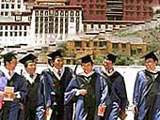 It was probably the most unforgettable and exciting moment of Zhamdu's life when he was presented with his graduation and master's degree certificates by Liu Qinghui, the president of Tibet University.
It was probably the most unforgettable and exciting moment of Zhamdu's life when he was presented with his graduation and master's degree certificates by Liu Qinghui, the president of Tibet University.
Zhamdu, 34, who majored in Tibetology during the past three years, was awarded a master of law. He was moved to tears Wednesday when he presented a bunch of flowers to his mentor Puncog Cering, a noted expert in Tibetology, to express his gratitude.
Zhamdu is one of the first group of post-graduates trained independently by universities in the Tibet Autonomous Region, in southwest China. He and another nine people who completed their post-graduate studies, were awarded graduation and master's degree certificates.
In addition to Zhamdu, Cering Bagzho and Lhaba Cering, who majored in the history of the Tibetan ethnic group, and Dawa, Pucering and Lobsang, who majored in the Tibetan language, also graduated from the Tibet University.
Migmar, Soinam Qimei, Yangga and Yangmei from the College of Tibetan Medicine, studied Tibetan medicine during the past three years.
Liu Qinghui said the graduation of the first group of masters in Tibet showed that higher education in the region had progressed to a new level.
Tibet now has four institutions of higher learning, Tibet University, the Tibet Institute for Nationalities, Tibet Institute for Agriculture and Animal Husbandry and the College of Tibetan Medicine.
With more than 6,600 students on campus, these universities and colleges have an 867-member faculty offering 50 undergraduate courses and 63 courses for specialist training.
With the approval of the State Council, four post-graduate training centers were set up in Tibet in 1998 and 2000.
Currently, 47 people are continuing their post-graduate studies in 12 specialties including ancient Tibetan language, the history of relations between ethnic Tibetans and the Han nationality, the modern history of Tibet, the history of art, traditional Tibetan music and Tibetan medicine.
Migmar, now a master of Tibetan medicine, said, "We're honored to be the first group of post-graduates trained in Tibet. It has been made possible by the leadership of the Communist Party of China and the concern of the motherland."
"It is the result of the Party's policies on nationalities, culture and education, and shows the Party attaches great importance to training high-level professionals for ethnic groups," she said.
In old Tibet, there was not a single modern school and education was controlled by temples. As a result, less than 2 percent of school age children received schooling and the illiteracy rate among young people was as high as 95 percent.
The majority of ordinary people in the region have had the right to education since the peaceful liberation of Tibet in 1951.The central government of China has invested heavily to boost local education, providing a comprehensive education system covering liberal education, the education of pre-school children and adults, vocational education and education for groups with special needs.
By 2001, Tibet had 1,010 schools of various kinds, and more than 390,000 students. Over 87 percent of school age children were at school and the illiteracy rate had dropped to less than 30percent.
Puncog Cering, an expert in Tibetology, expressed his satisfaction with the post-graduates' academic performance.
"I'm full of happiness, because it is the first time this has happened in Tibet," he said.
(Xinhua News Agency July 18, 2002)
|

